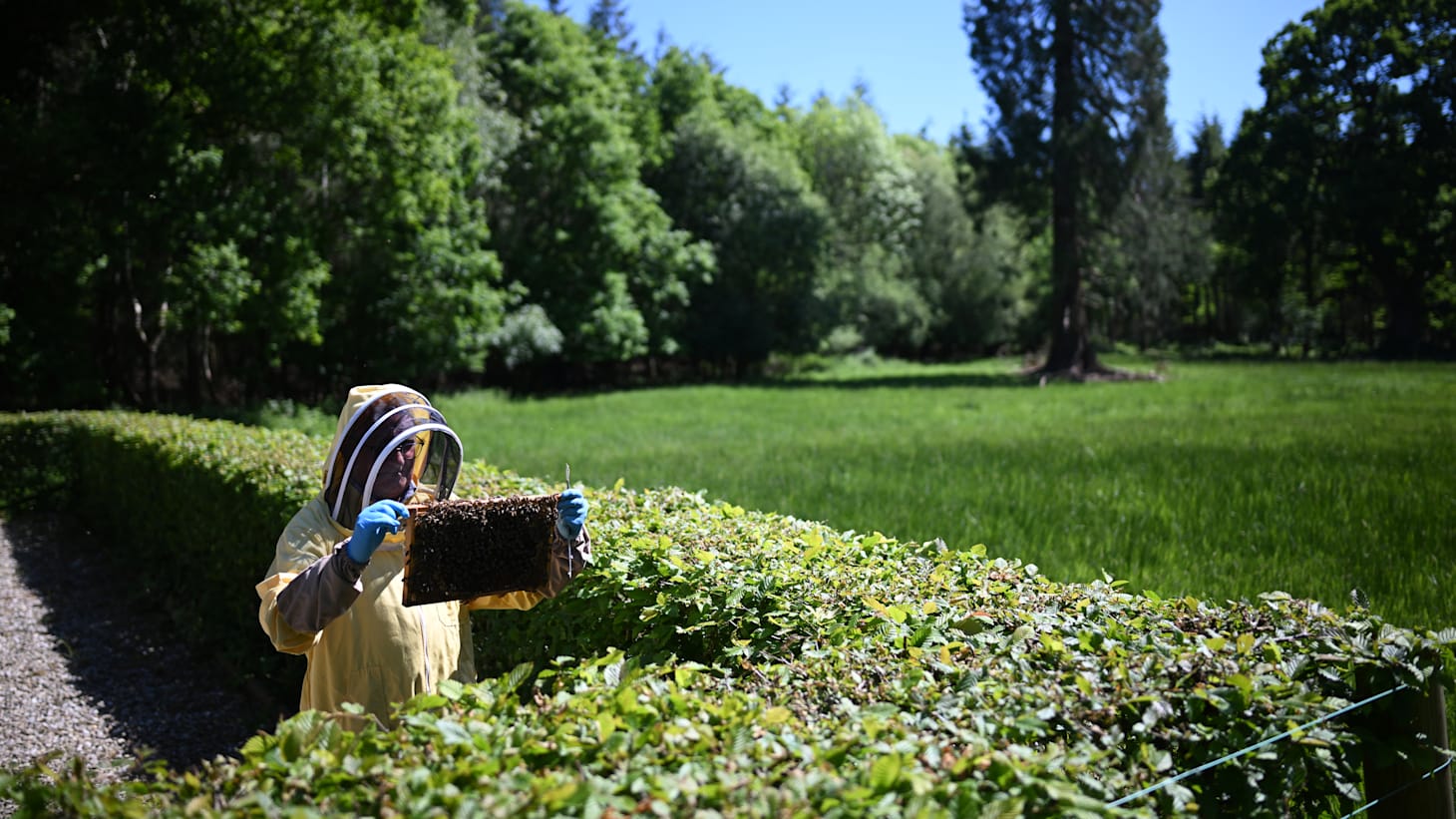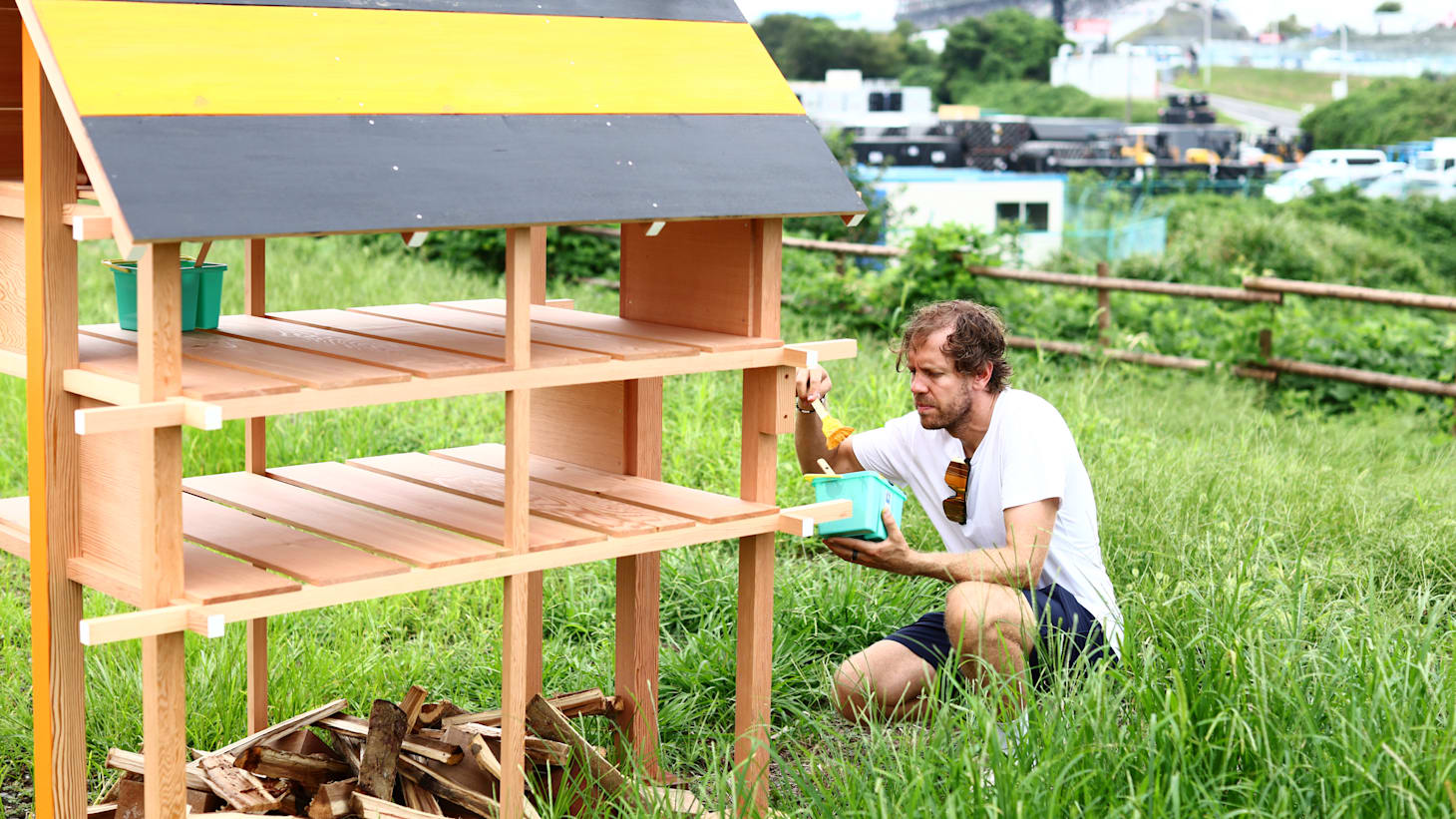World Bee Day: Athletes who have found gold in nature's sweetest hobby
World Bee Day: Athletes who have found gold in nature's sweetest hobby
Across the sporting world, a quiet colony of beekeepers is growing, each finding sweet solace in the slow, meditative rhythm of beekeeping. Whether it’s for calm, connection, health, or dealing with the sting of defeat, these athletes are proving that life is always a little sweeter when you bee-lieve.

Picture by Charles McQuillan/Getty Images
By Grace Goulding21 May 2025 08:10 GMT+96 min read
What do an adaptive rower, a Formula One champion, and a baseball pitcher have in common? They’ve all found something golden in the world of bees.
For athletes whose lives revolve around hopping from flower to flower of training and competing, beekeeping offers something different: a moment to slow down, breathe deeply, and reconnect with nature.
On World Bee Day (20 May), Olympics.com celebrates the growing number of sporting stars who’ve joined the swarm in pursuit of something golden, and, who along the way, have discovered something sweet amongst the combs: a sense of peace, purpose, and the occasional snack.
Guided by the buzz: a rower’s return to the hive
A steady hum fills the back patio of Aerial Gilbert's home in Petaluma, California. Not the roar of a crowd or the splash of oars in water, but the living rhythm of thousands of bees moving as one.
Gilbert, a former US adaptive rowing team member, stands calmly beside her hives, bare hands reaching into the mass.
“I can hear how the bees are behaving. If they’re agitated, if there are other bees trying to get in the hive, or if it’s too crowded or too hot or too cold,” she said. “What you want to hear is a calm, steady buzz. That means everything in the hive is going smoothly.”
Gilbert lost her vision in 1988 after unknowingly using eye drops that had been maliciously tampered with. Overnight, her world went dark. Beekeeping, once a beloved childhood passion, seemed out of reach. But years later, she found her way back, not by sight, but by sound.
Now, her ears are her guide. She’s learned to recognise the vibrational patterns of the bees’ waggle dance, a rhythmic message sent through the hive to signal where pollen can be found. Her fingers gently brush against her “girls,” as she calls them, gauging the mood of the colony with every movement.
“There’s so much visual information you get by looking at the honeycomb and the brood nest,” she said. “I didn’t think I could be a good beekeeper without being able to see. But I was wrong.”
Gilbert found new ways to connect, to listen, to lead. And in the gentle hum of her bees, she rediscovered purpose and power.

Picture by Clive Rose/Getty Images
Sebastian Vettel builds bee hives around the circuit during previews ahead of the F1 Grand Prix of Japan at Suzuka International Racing
Vettel and Beckham turn the spotlight on sustainability
On World Bee Day, the spotlight falls on biodiversity, sustainability, and the busy little pollinators who keep our ecosystems humming.
And no one has used that spotlight quite like Sebastian Vettel. The four-time Formula One world champion may be retired from racing, but he’s still going full throttle for the environment.
From constructing “Buzzin’ Corner” and bee-themed insect hotels at Suzuka to driving sustainably fuelled cars at the Nürburgring, Vettel is on a mission. “The bee is the perfect ambassador,” he said, “because it stands not just for the bee but for all other insects.” Vettel’s corner buzzed with purpose, a literal and symbolic pit stop for biodiversity in an increasingly fast-paced world.
“I want, with this project, to create awareness about the importance and the subject of biodiversity,” Vettel told F1. “It’s very exciting and a lot of work and passion went into the project. Standing up for biodiversity, which is not just insects, it is all types of animal … we have to celebrate variety not just in human beings, but nature, and we have to protect it. That’s really close to my heart and I want to stress this and raise awareness.”
Even football royalty can’t resist the buzz. David Beckham is a proud beekeeper and has been spotted swapping beekeeping tips with King Charles at Highgrove Gardens in 2024. “Having developed a love for the countryside, I’m on a personal mission to learn more about rural skills,” said Beckham, who now serves as an ambassador for the King’s Foundation.
Clad in full apiarist attire in his Netflix documentary, Beckham is seen tending his hives with the same meticulous care he once brought to a free kick. His bee efforts may not win trophies, but they’ve certainly earned the royal seal of approval.
Bee calm, bee fueled: cyclist Georgia Gould’s sweet rituals
Amid the thunder of wheels and whir of gears on the cyclocross track, London 2012 Olympic bronze medallist Georgia Gould finds her peace, and occasional snack, among the bees. What began in 2011 with a documentary on the vanishing honeybee turned into a personal mission, as well as a sweet source of race fuel for the Olympian.
“It’s a glorified landlord position,” she joked. “I give you a house, and I take your honey.” She harvests in the fall, under cover of night, to avoid disturbing her “docile” bees, though not without the occasional sting incident.
Gould savours the quiet ritual. “I eat the honey pre- and post-ride on toast with butter and in peppermint tea before and after cold cyclocross races and training rides. People ask what my neighbours say. I don't even think they know about the bees. They're not swarming like crazy. They're busy! Busy like bees.”
A hobby that stuck
For others, beekeeping began as a sweet little side project to pass the time, but quickly turned into a full-blown passion.
Such was the case for Dylan Cease, ace pitcher for the San Diego Padres, who found his way to the hive during the pandemic. “It was COVID, I was just bored,” he told the MLB. But after a deep dive into the health benefits of honey, Cease and his father, Jeff, were hooked.
Their harvests now yield up to 50 pounds of honey, flavoured by the seasons: wildflower in the spring, poplar in the autumn, and even the occasional “raisin” or “perfume” variety. “It’s always cool to see. Everyone who tries it swears it’s the best honey they’ve ever had.”
But for Cease, the joy lies in the sharing. He hands out jars to teammates, family, and even wedding guests. “The most satisfying part is giving it to people and seeing how excited it makes them.” Just like his curveball, Cease’s honey has earned rave reviews.
A third-generation beekeeper (though he didn’t know it at the time), Jack McGrath, former Irish rug-bee player and co-founder of OpenHive, also stumbled into the hobby during lockdown. It’s now a full-time passion with hives across Dublin and Wicklow, volunteer programmes, and partnerships with local businesses.
“Having people interested in this is so important," he said. "A generation ago, people like our parents would have known at least one beekeeper in their community. I’d say now very few people know a beekeeper.”
McGrath likens beekeeping to elite sport: “Something about beekeeping captured me right away. A bit like in high-level sports, it’s something that is a very complete experience. Everything else goes out of your mind because you have to concentrate right there in the moment."
Whether it’s about focus, recovery, sustainability, or resilience, athletes are learning what bees have known all along: community matters, timing is everything, and the sweetest rewards can be found in the hum of consistent, quiet effort.
대화 참여하기